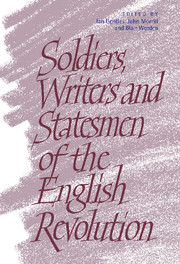Book contents
- Frontmatter
- Contents
- Preface
- Austin Woolrych: an appreciation
- 1 Secret alliance and Protestant agitation in two kingdoms: the early Caroline background to the Irish Rebellion of 1641
- 2 Of armies and architecture: the employments of Robert Scawen
- 3 George Digby, Royalist intrigue and the collapse of the cause
- 4 The iconography of revolution: England 1642–1649
- 5 The casualties of war: treatment of the dead and wounded in the English Civil War
- 6 ‘A bastard kind of militia’, localism, and tactics in the second civil war
- 7 Cromwell's commissioners for preserving the peace of the Commonwealth: a Staffordshire case study
- 8 Colonel Gervase Benson, Captain John Archer, and the corporation of Kendal, c. 1644—c. 1655
- 9 Repacifying the polity: the responses of Hobbes and Harrington to the ‘crisis of the common law’
- 10 Equality in an unequal commonwealth: James Harrington's republicanism and the meaning of equality
- 11 John Milton and Oliver Cromwell
- 12 From pillar to post: Milton and the attack on republican humanism at the Restoration
- 13 ‘They that pursew perfaction on earth …’: the political progress of Robert Overton
- 14 Locke no Leveller
- A bibliography of the writings of Austin Woolrych, 1955-95
- Index
13 - ‘They that pursew perfaction on earth …’: the political progress of Robert Overton
Published online by Cambridge University Press: 10 November 2009
- Frontmatter
- Contents
- Preface
- Austin Woolrych: an appreciation
- 1 Secret alliance and Protestant agitation in two kingdoms: the early Caroline background to the Irish Rebellion of 1641
- 2 Of armies and architecture: the employments of Robert Scawen
- 3 George Digby, Royalist intrigue and the collapse of the cause
- 4 The iconography of revolution: England 1642–1649
- 5 The casualties of war: treatment of the dead and wounded in the English Civil War
- 6 ‘A bastard kind of militia’, localism, and tactics in the second civil war
- 7 Cromwell's commissioners for preserving the peace of the Commonwealth: a Staffordshire case study
- 8 Colonel Gervase Benson, Captain John Archer, and the corporation of Kendal, c. 1644—c. 1655
- 9 Repacifying the polity: the responses of Hobbes and Harrington to the ‘crisis of the common law’
- 10 Equality in an unequal commonwealth: James Harrington's republicanism and the meaning of equality
- 11 John Milton and Oliver Cromwell
- 12 From pillar to post: Milton and the attack on republican humanism at the Restoration
- 13 ‘They that pursew perfaction on earth …’: the political progress of Robert Overton
- 14 Locke no Leveller
- A bibliography of the writings of Austin Woolrych, 1955-95
- Index
Summary
During the last years of Robert Overton's life, which were marked by nine years in prison (1663—71), he compiled a 360 page manuscript of prose and verse. ‘Goverments gaine & goodnesse &c’ (pp. 34–40), the segment that is edited here, is a treatise of advice to political malcontents. Overton was a deeply religious parliamentary officer who fought with dedication throughout the Civil War and was concerned with the successive governments established during the decade of revolutionary polity. The conclusions about government that he recorded after the restoration are the fruit of his experience and are foreshadowed in his writings and conduct during the interregnum. Overton is frequently mentioned by historians; he has been less than correctly described. His learning and moral rectitude are unquestioned, but he has been too easily tagged as fifth monarchist, leveller and uncertain ally. An examination of his manuscript and a review of his actions and observations before the restoration raise questions about the accuracy of these attributions as they reveal an increasingly realistic idealist who is credible and consistent.
Before turning to ‘Goverments gaine & goodnesse &c’ pertinent aspects of Overton's life will be considered: relations with his family, friends and other contemporaries, his political experiences and his published writings. He was the son and heir of John Overton of Easington, a gentleman of landed estates in south-eastern Yorkshire where Overtons had lived for generations. Robert matriculated at St John's College, Cambridge, in 1627, entered Gray's Inn four years later, and married Ann Gardiner in 1632.
- Type
- Chapter
- Information
- Soldiers, Writers and Statesmen of the English Revolution , pp. 286 - 303Publisher: Cambridge University PressPrint publication year: 1998



